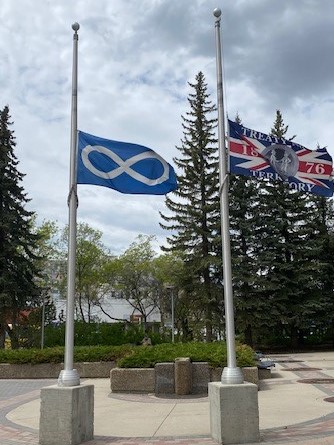Residential School Legacy
Supports for Residential School Survivors & Their Families
| National Indian Residential School Crisis Line: 1-866-925-4419 |
| Saskatchewan Indian Residential School Mental Health and Counselling Support Line: 1-866-250-1529 |
| First Nations and Inuit Hope for Wellness 24/7 Help Line: 1-855-242-3310 |
| Métis Crisis Line: 1-833-638-4722 |
Initiatives & Updates
Renaming of John A. Macdonald Road
History
John A. Macdonald played a significant role in the development of Canada’s Indian residential school system. Residential schools took Indigenous children away from their families, cultures and languages to assimilate them - so they would no longer exist as distinct peoples.
Residential schools were responsible for the hunger, neglect, abuse and death of thousands of Indigenous children in Canada. Indigenous families today continue to experience this pain, grief, loss and inter-generational trauma.
Moving Forward
Saskatoon seeks to be a welcoming and inclusive place to live, where every resident feels a sense of belonging. On June 28, 2021, Saskatoon City Council approved beginning the process to rename John A. Macdonald Road, to recognize the ongoing harm in the community experienced by residential schools. The City of Saskatoon is also committed to raising awareness and understanding of residential schools and their ongoing impacts.
Engagement Process
Learn more about the engagement process at saskatoon.ca/engage/renaming.
City lowers flags in honour of the Cowessess community - June 24, 2021
On June 24, 2021, Cowessess First Nation announced the discovery of 751 unmarked graves on the grounds of the former Marieval Indian Residential School (400 kilometres southeast of Saskatoon).
The City lowered its flags to half-mast to demonstrate its support and to honour the Cowessess community, the families of Marieval Residential School students, and all Survivors.
Many City staff responded by opening their meetings with an acknowledgement of the harm caused by residential schools to Indigenous people, and the lasting impacts on the Indigenous community. Support is being offered to City employees that are struggling with emotions such as grief and anger.
The effects of the discovery in Cowessess First Nation are being felt across Saskatoon by relatives, friends, and Survivors. At the same time, Indigenous and non-Indigenous people across Canada are steeling themselves for the discovery of additional unmarked graves in the months ahead.
The City is urging residents to support one another during this difficult time and to seek out additional assistance when needed. The Residential School Help Line can be reached at 1-866-925-4419 and the Métis Crisis Line at 1-833-638-4722.
City lowers flags in memory and honour of Kamloops residential school victims - May 30, 2021
To recognize and honour the memory of 215 children whose remains have been found buried at the site of a former Kamloops residential school in Tk'emlúps te Secwépemc First Nation Territory, flags at all City-owned facilities, including the Reconciliation Flag, will lower to half-mast beginning May 30, 2021. Flags will remain half-mast until June 3, 2021.
“We are lowering our flags to honour these children and also the thousands of other children who died at residential schools across Canada, many right here in Saskatchewan,” says Mayor Charlie Clark. “The impact of residential schools on generations of Indigenous people, Survivors and their families continues to be felt across the entire country. We must all come together in the spirit of reconciliation, action and hope.”
City Council will also observe one minute of silence to honour all residential school victims at its meeting Monday, May 31.
To honour those children lost in Kamloops, the 4,000 children who are still missing and their families, the City encourages Saskatoon residents, along with City Council and all City employees, to wear Orange on Monday, May 31 because every child matters.

